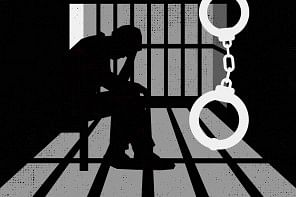As Questions Arise

"I will not be sending my children to their art classes this Friday," says 33-year-old Kishwar Sultana, a dentist who lives with her family in Boro Moghbazaar. Her children, a 6-year-old daughter and a 4-year-old son, regularly attend art classes held every Friday at the Shishu Academy. Sultana takes the weekend off and accompanies the children to the academy as well. "I love the empty spaces at the Shishu Academy. While my children are working on their art pieces, I like to take walks, listen to music on my mobile phone or chat with the other parents."
After the attacks last week, Sultana has decided to give it a break for a week or two and not send her children to the academy, near the Dhaka University Campus, and also close to the area where Dipan was murdered. "I even have half a mind to stop lessons once and for all," she says. "There is too much tension in the area and I don't think I can deal with it. What is another murder takes place or a riot breaks out in the area? I don't think I will be able to manage my children and myself!"

Last week, fear gripped the city when the news of the attacks on three in a Lalmatia office, including a blogger, and the murder of Faisal Arefin Dipan, the owner of Jagriti Prokashony in Shahbagh, spread like wild fire. People in this country have been witnessing murders of all kinds in the past few years, where many of the cases remain unsolved, and will probably remain so. In a nutshell, the gruesome murder of journalists Shagor and Runi in February 2012, inside their very home, still manage to shock. Killing of bloggers and writers came next. The attack and murder of Avijit Roy on the streets earlier this year, in front of many, managed to spark outrage amongst people in the country, but also a certain amount of fear.
To make matters worse, according to reports, Dipan's father Abul Kashem Fazlul Haque, who discovered his son's body, had in fact declared that he was not going to ask the authorities for justice. Clearly, Haque is not only devastated with the loss of his child, but he might have also lost hope with the system, the on going murders and the un-explainable terror that is looming over the city.


After the killings of the foreign nationals last month, police check posts were placed in every other nook and corner in Dhaka city. This was done, according to Shahin Alam, an officer at the Gulshan thana, "for security." Even though the month long extra check posts didn't change much in terms of security, they did manage to create horrendous traffic jams in alleys and connecting roads. "I suffer every day because of these check posts," says Parveen Azim, a 42-year-old accountant who works at a private company in Gulshan. "I live in Baridgara DOHS and every day my rickshaw is stopped by the officers. Either I am asked to get off, walk and hire another rickshaw, or I am asked a million questions before they let my rickshaw go. The other night my aunt was admitted to the United Hospital emergency section. At 11:00 pm in the night, the officials made me and my son walk from the DOHS gates to the hospital. I was angry but could not say anything. It made me wonder if the country was in a state of war, and we were mere refugees, on our own soil." And many more similar stories of anguish and frustration emerge in other parts of the city as well. Clearly, the check posts and harassments of law enforcement officers raise questions amongst the citizens – who exactly are they protecting?


When Icarus went too close to the sun, his wax wings melted. As a result, he fell into the river, drowning. The villagers heard his screams, noticed his effort to stay afloat and also watched as the boy with the wax wings eventually drowned. But the birds would not stop singing. The farmer did not stop his work in the fields; the postman followed the same route on his cycle as did the milkman and the shopkeeper, who was never late with opening his shutters. Life went on, despite the tragedy that occurred in front of many.
Several in Dhaka ignored the rising fear and organised protests for the cold blooded murders, where hundreds participated, showing support. As the report is being filed, one more is being organised by free thinkers, professionals and nation builders. It's high time to abolish the fear that we face every day, while going to work and returning home from classes. We need to face the uncertainty that looms over the city and challenge the system that breaks us within.



 For all latest news, follow The Daily Star's Google News channel.
For all latest news, follow The Daily Star's Google News channel. 



Comments